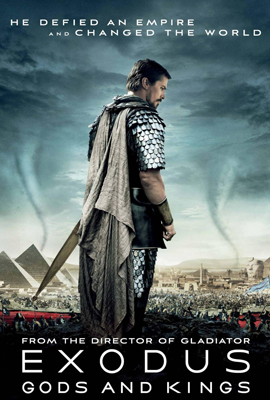 With the exception of “Ben-Hur,” I’ve always looked at the Biblical epics from the ‘50s and ‘60s as curiosities. For me, there was always something ‘not-quite-right’ about them- for instance, did every Roman chasing down the Nazarene have to be played by a British actor? Couldn’t one Roman be played by an actual Italian? I guess not- after translating the Bible into a Hollywood screenplay, you’d want a Shakespearean actor to deliver that ponderous dialogue.
With the exception of “Ben-Hur,” I’ve always looked at the Biblical epics from the ‘50s and ‘60s as curiosities. For me, there was always something ‘not-quite-right’ about them- for instance, did every Roman chasing down the Nazarene have to be played by a British actor? Couldn’t one Roman be played by an actual Italian? I guess not- after translating the Bible into a Hollywood screenplay, you’d want a Shakespearean actor to deliver that ponderous dialogue.
For me, that’s the endearing quality of those old Biblical epics: interesting casting of actors that spew stilted dialogue. While these idiosyncratic flaws can be off-putting, I find them campy- can you really beat Edward G. Robinson confronting Charlton Heston in front of the Golden Calf in “The Ten Commandments?” While religious films have seen a slow resurgence since “The Passion of the Christ” and advanced CGI effects have made directors like Darren Aronofsky want to tackle Biblical stories like this year’s “Noah,” it was pure curiosity and the casting choices that made me want to watch Ridley Scott’s “Exodus: Gods and Kings.”
The story of “Exodus: Gods and Kings” is the story of Moses leading the enslaved Hebrews out of Egypt from the Bible’s book of Exodus. If you missed Sunday school that day, I’ll recap: after a prophecy tells the Egyptians that a first-born Hebrew male will lead the Hebrew slaves out of Egypt, the Egyptians devise a plan to kill all of those first-borns. They manage to do a good job except they miss the one first-born Hebrew male they were really looking for- Moses (his mother had the foreknowledge to drop the baby into a basket and send it down a stream to where the Egyptian royalty regularly bathed). Moses is found by a maid of the Egyptian king and raised alongside the Pharaoh Ramses, the two boys ostensibly becoming brothers.
The film begins with Moses (Christian Bale) and Ramses (Joel Edgerton) about to do battle with a surrounding horde of invading Hittites. Before departing for battle, a prophecy foretells of a leader being saved and the savior becoming a leader. Naturally, Moses saves Ramses life in the field of battle and the Egyptian king Seti (John Turturro- at last an Italian actor!) begins to have more faith in Moses as the next leader of Egypt than his own son, Ramses. On a suspicion that one of Seti’s viceroys, Hegep (Ben Mendelsohn), is embezzling money, Seti chooses Ramses to go on the fact-finding mission- the mission clearly beneath Ramses’ royal stature. Moses allows Ramses to save face by volunteering to visit the viceroy himself and finds another fact during his mission- one of the elder Hebrew slaves, Nun (Ben Kingsley), informs Moses that he is indeed that prophesized leader of the Hebrew slaves.
What follows is the revelation to Ramses of Moses’ true identity and Moses subsequent exile against the more prudent judgment to kill Moses, as voiced by Egyptian queen Tuya (Sigourney Weaver) – Ramses can’t kill Moses, they’re brothers after all. Moses’ exile leads him to the ‘burning bush’ and God appearing in the form of a little boy telling Moses to return to lead the Hebrew slave rebellion. Once Moses begins, his progress is slow. God grows impatient and tells Moses of his disappointment. “After 400 years (of slavery), you’re impatient?” Moses quips- love that dialogue- and God asks Moses to sit back and watch. Let the plagues begin!
Given Ridley Scott’s deft handling and account of the ten plagues that God inflicts on Egypt to force Ramses into releasing the Hebrew slaves is the highlight of the film. While Scott’s sweeping direction is closer to the work in his film “Gladiator,” the effects and culmination of the plagues’ effect on the Egyptians is really well-done. And, if you’re looking for a crusader, former caped crusader Christian Bale does a good job as Moses and grounds the movie.
Of course, I’m the guy who likes the campiness. I loved the irony that Ramses and the viceroy are portrayed by Australian actors Edgerton and Mendelsohn, who did such good work in the Australian film “Animal Kingdom” and are forced to wear enough mascara to make Max Factor blush (damn those hieroglyphics)- I mean, leave it to a British director to cast Aussies as the bad guys. The casting of Turturro, Weaver and Kingsley are other novelties: Kingsley as the perennial Hebrew good guy makes sense after his role in “Schindler’s List” and Weaver’s appearance makes sense after starring in Scott’s film, “Alien,” but Turturro’s appearance I can’t explain, which just adds to the casting fun.
At a two-and-a half hour running time, I wasn’t bored with “Exodus: Gods and Kings,” mainly because I looked at the entertainment beyond the story. If you find the charm and humor inherent in odd casting and the fantastical being not-so-fantastic, Scott’s “Exodus” may interest you. If none of this sounds appealing, watching this movie may make you feel like you’re enduring one of the film’s plagues of Egypt.
